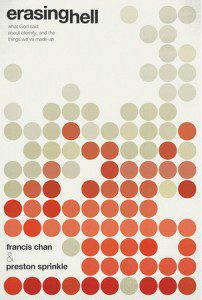For someone who doesn’t actually believe in hell, I’ve spent a lot of time reading about it lately, a prurient pastime that I’ll leave others to psychoanalyze. In the last two years there have been some fascinating books on the subject, my favorite of which is Sharon Baker’s Razing Hell. That book is the best I’ve found at tracing the development of the doctrine of hell through the Bible and church history, as well as proposing an alternative understanding of what is meant by eternal punishment.
As I’ve written recently for Patheos, I also greatly appreciated Rob Bell’s compassionate and thoughtful book on hell that came out earlier this year. Not everyone felt that way, however, as you can see from the fiery discussions here and here.

This week, evangelical writer and pastor Francis Chan throws his hat into the ring with a brief but deliberate refutation of Rob Bell’s work. Erasing Hell: What God Said About Eternity and the Things We Made Up is Chan’s answer to Bell’s brand of Christian universalism, or the belief that God will save every person. Tragically, says Chan, this isn’t the case; plenty of people are going to be a-roastin’ and a-toastin’. Forever. “For those who follow Jesus, there is everlasting life in the presence of God,” he promises. “But for those who don’t follow him, there will be punishment.” (38)
In contrast to some other conservative Christians who have written about hell (I’m especially thinking of Robert Jeffress’s gleeful Hell? Yes! from a few years ago), Chan seems genuinely choked up about this. Consider this scene where he’s sitting in a busy Starbucks looking with wonder and distress at all the people around him:
The place buzzes with life. Meanwhile, I sit here reading passage after passage after passage, which all say that some of those people are going to hell. It sickens me to say that, and I can’t explain how conflicted I feel right now. There are at least a dozen people within ten feet of me right here, right now, that may end up in the agony I’m studying. What do I do? Do I keep writing? Keep studying? Should I bag this whole book thing and start building relationships with them? How can I believe these passages yet sit here silently? (72)
A number of things bothered me about this book (not the least of which is the oral writing style with its plethora of italicized words, exclamation points, and rhetorical questions). One is that Chan and his co-author Preston Sprinkle, a Bible college professor who helped Chan with the historical and biblical background, claim that since Jesus didn’t go out of his way to challenge first-century Jewish understandings of hell, he obviously agreed with them. (82) It’s hard to prove an argument of absence. Isn’t it possible that we have no record of Jesus reformulating hell because the idea wasn’t significant enough to the Gospel writers for them to record? As Chan and Sprinkle admit, there isn’t much about hell in the Old Testament. (50)
Another flaw lies in the book’s discussion of Matthew 25, that discomfiting and wonderful scripture about the sheep and the goats. “The sheep (believers in Jesus) and the goats (unbelievers) are divided into two camps, and Jesus decides who’s who based on what they’ve done in their lives.” (82) Fair enough on the last point. But did I miss the doctrinal litmus test that the authors seem to think happens in this passage? Nowhere does Jesus mention belief as a pre-requisite; it’s all about action. “Believer” doesn’t mean squat if the people have not visited the sick and clothed the naked.
And of course the idea of Jesus as an angry dispenser of eternal punishment gives me pause:
…the wrath of Jesus [as depicted in 2 Thessalonians 1] is retributive and not corrective. In other words, the wrath wasn’t intended to correct the behavior of those opposing Christ to make them fit for salvation. Rather, the wrath is an act of—dare I say—vengeance. (102)
One of the things I greatly appreciated about this book is that even though it gives every appearance of having been hastily put together as a response to Rob Bell’s work, it never engages in the kind of knee-jerk heckling that some even hastier Christian responses have generated. Chan never questions Bell’s sincerity, never says Bell couldn’t possibly be a Christian if he holds such progressive beliefs, never anathematizes Bell in any way. What’s more, I think the book actually takes pains to present Bell’s ideas in context and not caricature them.
Conservative evangelical Christians deserve civil, high-minded arguments like this that don’t stoop to attack and turn off the very people they’re trying to persuade. If there is such a thing as a loving book on hell, this is it. I may not agree with it, but I laud the achievement nonetheless.

